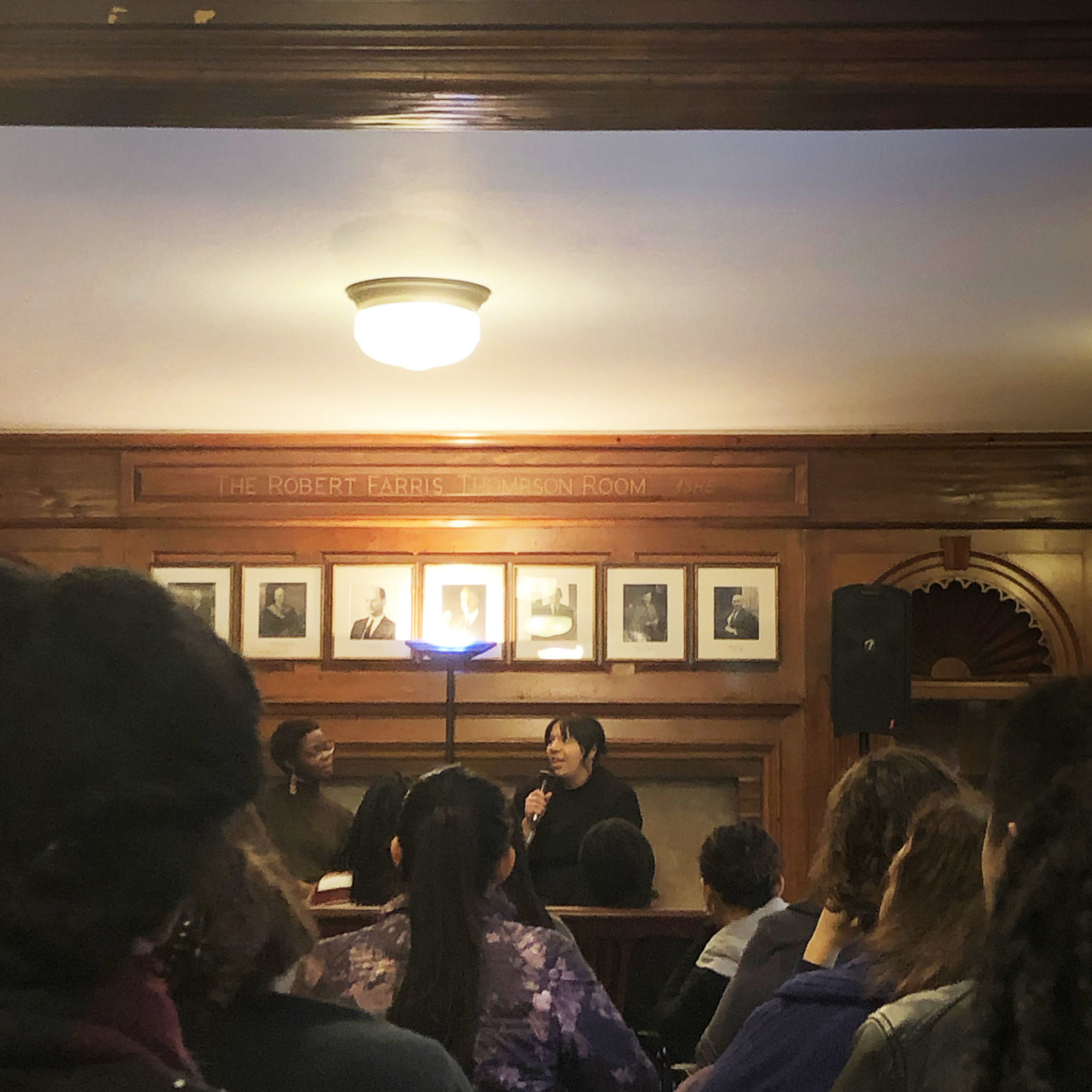
Neha Middela
In addition to the cooking basics for chefs — which includes taste, presentation and originality — Kiki Louya told her audience on Monday that she also prioritizes sustainability and social justice, even if she has “to cause a little bit of a scene.”
Over 40 attendees packed into the Thompson Room in Timothy Dwight College to hear from Louya, co-founder of Folk Detroit — a restaurant in Detroit — and the Farmer’s Hand — a Detroit food market. The Yale Sustainable Food Program and The Afro-American Cultural Center hosted a conversation with Louya, a Detroit-based chef and restaurateur, as part of their “Chewing the Fat: Cooking Across the Black Diaspora” series.
“The most important thing I’ve learned is to listen. Every conversation that may be some kind of argument is a way to see where the other person is coming from and a way to educate one another,” she said.
Erwin Li ’16, the Lazarus Fellow in Food and Agriculture at the YSFP, introduced the talk as a means to explore “identity through cooking.” He added that both the YSFP and Afro-American Cultural Center are hosting programs in honor of Black History Month as well as the 50th anniversary of the Yale Department of African American Studies and the Afro- American Cultural Center.
Kenia Hale ’21 — a culinary events manager for the Yale Sustainable Food Program and student liaison between the YSFP and the Afro-American Cultural Center — moderated the conversation. She fed the chef questions regarding Louya’s early days in the restaurant and food industry, her commitment to equity and movements for food justice in Detroit. Louya also outlined her “triple bottom line business practices,” which relate to her overall social, environmental and financial goals.
Louya said she originally considered going into law to appease her parents. She moonlit at restaurants to “immerse [herself] in food” after her nine-to-five at a nonprofit. She eventually decided to go to culinary school before moving full time into the restaurant industry. Looking back, Louya knew that she “didn’t listen to [herself] for a long time.”
According to Louya, her experience growing up in Detroit as a biracial woman with Congolese heritage influenced her path to becoming an “accidental food justice warrior.” As such, she said she uses her platform to further economic and food equity. Louya noted the lack of representation of black female chefs in the restaurant industry. Still, she added that she was surprised to find out she was the only black female restaurateur and African-American head chef in Detroit.
In her efforts to create change, Louya said that she was prepared to “make whatever noise [she] needed to make.” She highlighted specific practices such as sourcing from small, sustainable farms, limiting food waste and implementing a no-tipping policy within her restaurant — as the practice of tipping can lead to pay inequities that have historically disadvantaged African-American women.
She also spoke about her personal engagement with the city of Detroit, highlighting the popular discourse about the city. She said that “the auto industry made a lot of the city but also took away a lot of the city,” and added that industrial developments and recent gentrification resulted in the breakup of neighborhoods as well as a loss of food culture. She mentioned recent efforts in the city to ensure equal access to nutritional food — including urban farming initiatives and food cooperatives.
When asked about her favorite food to cook, Louya pointed to a basic: bread.
“Bread baking is incredible. I think the process of bread is a process of patience, taking something that’s living and feeding it and making it beautiful … it’s meditative, [and I’m] always working to refine it and make it better.”
Towards the end of the talk, Louya fielded questions on topics such as local bureaucracies, the ethics of using services like Uber Eats and the role of genetically modified organisms. Louya candidly revealed the dilemmas she faces as a socially conscious entrepreneur, adding that she has to grapple with the fact that sustainable food practices and attention to employee wages result in increased costs. As such, her prices are higher than she would want.
Johanna Obenda, a fellow at the Yale University Art Gallery, stated that she enjoyed listening to Louya and that the talk enabled her to reflect on her own identity as a Congolese American, the “particularities of what it means to be a black American” and the ways that these particularities are “illustrated through food.”
The Yale Sustainable Food Program is located at 301 Prospect St.
Neha Middela | neha.middela@yale.edu







